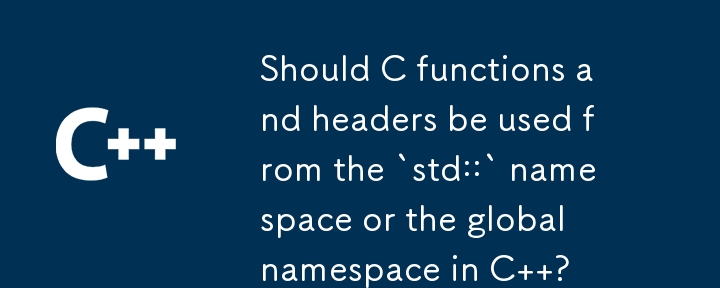

Using C Headers in C++: Namespaces or Global Scope?
In C++, one can access C functions and headers by modifying the header file names (e.g., stdio.h to cstdio, stdlib.h to cstdlib). However, it raises the question of whether to use functions from the std:: namespace or the global namespace for these headers in C++ code.
Namespace vs. Global Scope in C++
According to the C++11 Standard, every C header with a ".h" extension behaves as if its names are placed within both the global namespace and the namespace std. It remains unspecified whether these names are first declared in the std:: namespace and injected into the global namespace or vice versa.
Preferred Approach
To ensure compatibility with future C++ revisions and remove potential ambiguities, it is recommended to use the "cname" headers and declare and define functions within the std:: namespace. Using the old ".h" headers is deprecated and has been identified for removal in upcoming revisions.
Example Code
Prefer the following code snippet:
#include <cstdio>
int main() {
std::printf("Hello world\n");
}over:
#include <stdio.h>
int main() {
printf("Hello world\n");
}Conclusion
While it's possible to use both std:: and the global namespace for C functions and headers in C++, the preferred approach is to include the "cname" headers and use the declarations and definitions from the std:: namespace for consistency with future C++ revisions and to avoid potential issues.
Ce qui précède est le contenu détaillé de. pour plus d'informations, suivez d'autres articles connexes sur le site Web de PHP en chinois!
 Les derniers prix des dix principales monnaies virtuelles
Les derniers prix des dix principales monnaies virtuelles
 Que signifie vram ?
Que signifie vram ?
 Comment ouvrir le fichier bak
Comment ouvrir le fichier bak
 Quelle est la priorité de l'interruption ?
Quelle est la priorité de l'interruption ?
 html définir la taille de la couleur de la police
html définir la taille de la couleur de la police
 La valeur d'entrée Excel est illégale
La valeur d'entrée Excel est illégale
 Fonctions de la commande tracert
Fonctions de la commande tracert
 Utilisation de typedef en langage C
Utilisation de typedef en langage C